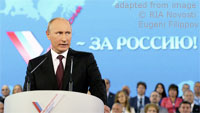Putin’s Front: the end of politics?

(Moscow News – Anna Arutunyan, editor and correspondent at themoscownews.com – June 17, 2013) Remember the season finale of “Game of Thrones,” when Daenerys Targaryen liberates thousands of slaves, and then tells them that she didn’t give them their freedom because it’s not hers to give? The people are so struck by her gesture that they physically rally around her, reaching to touch her and calling her their mother.
It was supposed to be an aweinspiring scene of how one person can build up power and use it for the good. But I found it one of the scariest scenes in the show precisely because I remember being in the middle of very similar situations. And it goes without saying that the apex of whatever everyone’s reaching their hands to isn’t a silverhaired princess with dragons, but a real-life human being who is usually unable to resist taking advantage of the immense power that hundreds of other human beings have just willingly handed over to him.
George R. R. Martin, the author of the fantasy series, would do well to pay attention to the development of Russia’s Popular Front, which just elected Vladimir Putin as their leader. On television, there were faces filled with child-like awe and chants of the leader’s name. Stanislav Govorukhin, the film director and Putin’s campaign manager, described the issue of who would lead the movement as “a stupid question.” It may have been a political organization, but the process centered on people yelling and reaching out something that had very little to do with politics.
It wasn’t “Game of Thrones,” but it was scary to watch.
The People’s Front, created in May 2011 as an apparent platform for Putin’s return to the presidency amid waning support for his United Russia party, is widely referred to as a political movement, except that it really isn’t. Its current charter describes its aims as very amorphous, “mutual trust, cooperation, and civil solidarity in the name of Russia’s historical success; its freedom, thriving, well-being, and security.”
The real principle behind the People’s Front is network-building establishing links so that everyone can literally be three handshakes away from the president. Some of the regular members of the group describe it completely devoid of any ideological awe or loyalty. They simply see it as a way to get things done, from raising the salaries of local doctors to getting promotions and contracts for their companies on a local level.
United Russia already tried this back when Putin was prime minister by setting up reception offices for Putin around the country where citizens could go ask for anything from getting gas pipes to receiving medical treatment.
There is something deeply archaic in such interplays, where the key asset is physical access to the personal power embodied in human, rather than institutional, leadership he who has the Tsar’s ear has power.
There’s also something incredibly modern about it a ref lection of disillusionment with established political institutions on the one hand and viral, grass-roots network-building as a means to get things done on the other.
In that sense, the People’s Front has deep parallels with the U. S. Tea Party. The only difference is the latter’s lack, so far, of a charismatic leader whose personal power you can tap into to get what you want.
It’s no coincidence that the pro- Kremlin Izvestia paper called the People’s Front an “exact analogue” of Organizing for Action, a support group from Barack Obama’s campaign team.
So what’s so scary about that? Since we’re dealing with something that’s both very old and very new at the same time, it may not be as scary as I’m making it out to be. But any time you are dealing with personalized, as opposed to institutionalized power, there are very few checks between you and the force you want to exploit for the good. That may be the reason that fantasy epics like “Lord of the Rings” and “Game of Thrones” are tackling this re-emerging phenomenon better than political analysts.
